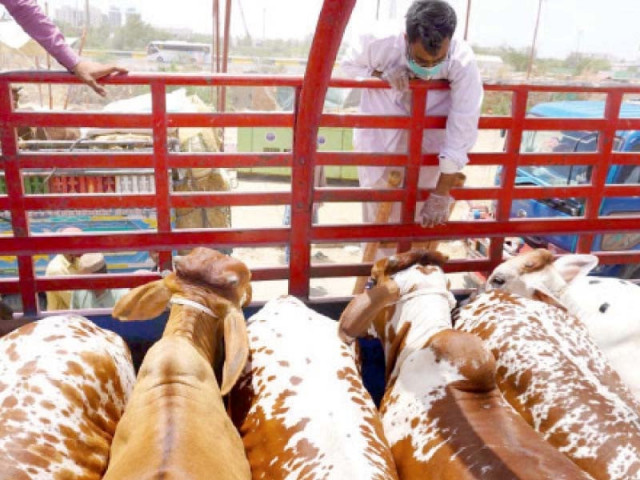Price surge dampens animals sale
Citizens express concern over 50-70% surge in prices compared to last year

The trade of sacrificial animals has gained momentum in makeshift cattle markets across the provincial capital ahead of Eidul Azha on Tuesday.
However, many shoppers expressed dissatisfaction with the increased prices of sacrificial animals this year compared to previous years.
Several citizens complained about a 50-70% surge in sacrificial animal prices compared to last year. Muhammad Rizwan emphasized that Eidul Azha, a religious festival centred around sacrifice, has turned into a commercial activity.
The skyrocketing prices have made it challenging for citizens to fulfil this religious obligation.
Wajid Rasool, another citizen, desired to sacrifice a goat but found that the rates of small animals exceeded his budget.
"I have visited different cattle markets in the city but cannot find a suitable bargain. The prices of small sacrificial animals are far beyond the reach of common citizens who are already battling unprecedented inflation. Most livestock vendors are demanding Rs60,000 to Rs75,000 for a reasonable-sized goat or sheep, and for well-built animals, there is no limit to vendors' demands. In some markets, vendors are even demanding Rs400,000 for a pair of goats," he pointed out.
Wajid stated that livestock vendors blame high transportation and cattle farming costs, along with overall inflation in the country, for the increase in sacrificial animal prices. Additionally, vendors accuse the local administration and the 'batha mafia' of extorting money under the pretext of providing services that are supposed to be free of cost in temporary cattle markets.
Muhammad Tahir, another citizen, called for government regulation of the sacrificial animal trade to eliminate middlemen and profiteers. While acknowledging that cattle farmers, who raise these animals throughout the year, are justified in seeking some profit for their year-long efforts, he emphasized the need to curtail the role of investors and middlemen to make the entire process of acquiring sacrificial animals easier and hassle-free.
"The current price trend indicates that a significant number of citizens, especially those from the salaried class, will not be able to perform the sacrifice this year," he said. An average-sized goat or sheep is currently being traded for Rs50,000 to Rs70,000, whereas the same-sized animal was sold for Rs30,000 to Rs35,000 last year.
Surveys conducted in different sacrificial animal markets reveal that cattle farmers and traders are demanding Rs50,000 to Rs70,000 for a goat, Rs45,000 to Rs65,000 for a sheep, and Rs120,000 to Rs180,000 for a calf/cow of average weight. Well-built or show animals have significantly different prices in the city.
Cattle farmers and vendors attribute the high prices of sacrificial animals to high transportation costs, fodder prices, labour rates, and, above all, the unprecedented inflation of the past year.
Qaseem Akhtar, a cattle farmer, complained about the doubled transportation charges compared to last year. He stated, "Farmers have to bear high transportation charges and bribe the police during transit, and citizens expect them to sell their produce at incredibly low rates in cities. We raise animals throughout the year to earn a livelihood during the Eid season."
Animals from all over Punjab are being brought to Lahore for sale. Nine cattle markets have been set up in Lahore.
Published in The Express Tribune, June 28th, 2023.



















COMMENTS
Comments are moderated and generally will be posted if they are on-topic and not abusive.
For more information, please see our Comments FAQ